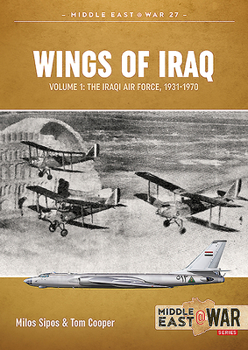Wings of Iraq: Volume 1 - The Iraqi Air Force, 1931-1970
(Book #27 in the Middle East@War Series)
Officially established on 22 April 1931, around a core of five pilots and 32 aircraft mechanics, the Royal Iraqi Air Force was the first official native military flying service of any Arab country.
Founded to support the Iraqi armed forces and the British against revolts by local tribes, it saw extensive combat and gradually grew into a potent force. During the Anglo-Iraqi War of 1941, it became involved in its first conventional campaign in support of an anti-British coup but was destroyed as a fighting force. It was still recovering when deployed in combat again, this time against Israel in the course of the Palestine War of 1948-1949.
During the 1950s, the Royal Iraqi Air Force experienced a phase of unprecedented growth through the acquisition of several batches of modern British-built aircraft. The 14 Tammuz Revolution of 1958 toppled the British-imposed monarchy and cut the ties to London. For the next five years, the Iraqi Air Force (IrAF) maintained close links to the USSR and became the first Arab air force to operate types like the MiG-19 and MiG-21, and was the first equipped with Tupolev Tu-16 medium jet bombers.
Through the 1960s, the IrAF played a dominant role in internal Iraqi politics, determining the fate of the nation to an unprecedented degree, became involved in the June 1967 War with Israel, and were instrumental in the putsch of 1968 that brought the Ba'ath Party to power.
While virtually 'born in battle', the Iraqi Air Force remains one of the least known and most misinterpreted military services in the Middle East. Richly illustrated, Volume 1 of Wings of Iraq provides a uniquely compact yet comprehensive guide to its operational history, its crucial officers and aircraft, and its major operations from 1931 to 1970.
Founded to support the Iraqi armed forces and the British against revolts by local tribes, it saw extensive combat and gradually grew into a potent force. During the Anglo-Iraqi War of 1941, it became involved in its first conventional campaign in support of an anti-British coup but was destroyed as a fighting force. It was still recovering when deployed in combat again, this time against Israel in the course of the Palestine War of 1948-1949.
During the 1950s, the Royal Iraqi Air Force experienced a phase of unprecedented growth through the acquisition of several batches of modern British-built aircraft. The 14 Tammuz Revolution of 1958 toppled the British-imposed monarchy and cut the ties to London. For the next five years, the Iraqi Air Force (IrAF) maintained close links to the USSR and became the first Arab air force to operate types like the MiG-19 and MiG-21, and was the first equipped with Tupolev Tu-16 medium jet bombers.
Through the 1960s, the IrAF played a dominant role in internal Iraqi politics, determining the fate of the nation to an unprecedented degree, became involved in the June 1967 War with Israel, and were instrumental in the putsch of 1968 that brought the Ba'ath Party to power.
While virtually 'born in battle', the Iraqi Air Force remains one of the least known and most misinterpreted military services in the Middle East. Richly illustrated, Volume 1 of Wings of Iraq provides a uniquely compact yet comprehensive guide to its operational history, its crucial officers and aircraft, and its major operations from 1931 to 1970.
Format:Paperback
Language:English
ISBN:1913118746
ISBN13:9781913118747
Release Date:October 2020
Publisher:Helion & Company
Length:96 Pages
Weight:0.75 lbs.
Dimensions:0.3" x 8.3" x 11.7"
Related Subjects
HistoryCustomer Reviews
0 rating





